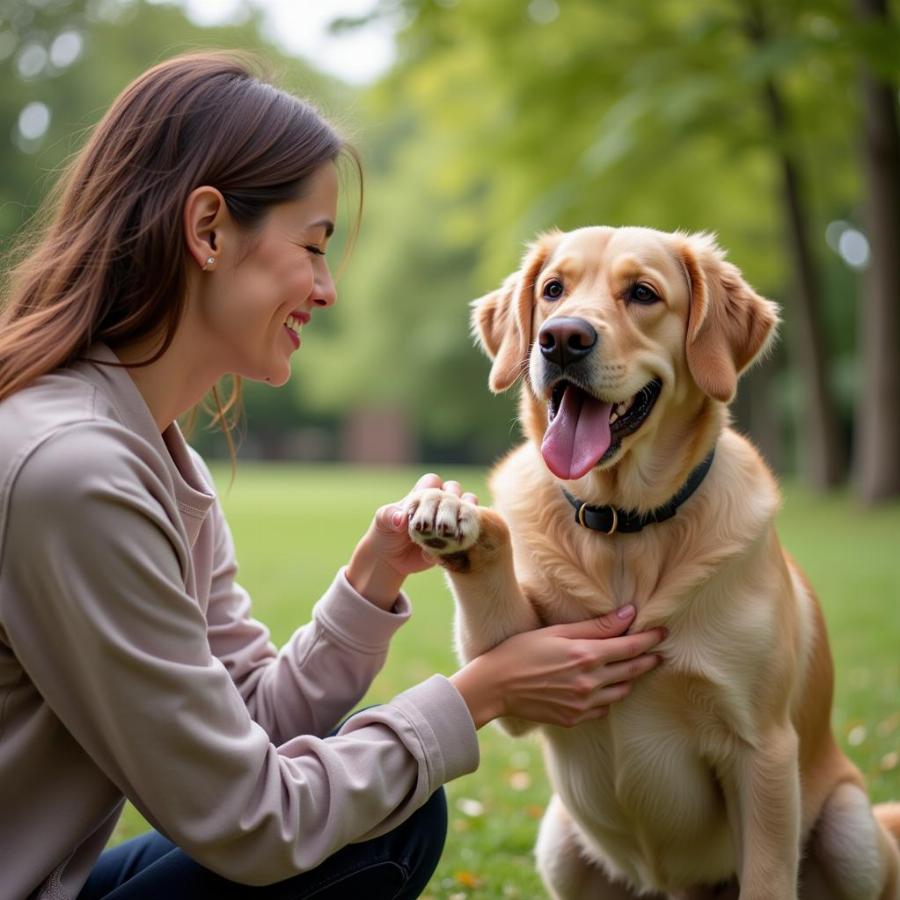“Old dogs can’t learn new tricks” is a saying we’ve all heard, but the truth is, it’s simply not true! While it may seem like puppies are constantly learning and older dogs are set in their ways, age doesn’t have to limit a dog’s ability to learn and adapt. With the right approach and a little patience, you can teach your senior dog new skills and enhance their lives.
Debunking the Myth: Why Age is Just a Number
The saying “old dogs can’t learn new tricks” likely stems from the observation that puppies are highly receptive to learning during their critical socialization period. However, this doesn’t mean that learning shuts down in older dogs.
The canine brain, much like the human brain, is capable of lifelong learning. What might differ are factors like:
- Motivation: Older dogs may have different motivations than their younger counterparts. While a puppy is eager to please and explore, a senior dog might be more food-motivated or prefer calmer learning environments.
- Physical Limitations: Arthritis, vision or hearing loss can impact a senior dog’s learning experience. It’s essential to tailor training methods to accommodate these limitations.
- Learning Pace: Just like us, older dogs might learn at a slower pace than puppies. Patience and positive reinforcement are key!
Tips for Teaching an Old Dog New Tricks
Teaching an older dog can be an incredibly rewarding experience for both you and your furry companion. Here are some tips to make the process enjoyable and successful:
-
Consult Your Veterinarian: Before starting any new training program, it’s wise to consult your vet to rule out any underlying health conditions that might be affecting your dog’s ability to learn.
-
Keep it Short and Sweet: Senior dogs may have shorter attention spans. Opt for shorter, more frequent training sessions to keep them engaged and prevent frustration.
-
Positive Reinforcement: Positive reinforcement methods, such as rewarding with treats, praise, and toys, are highly effective for dogs of all ages, especially seniors. Keep the energy upbeat and encouraging.
-
Break It Down: Divide new tricks into smaller, manageable steps. This allows your dog to experience success along the way, boosting their confidence.
-
Be Patient and Understanding: Remember that learning new things can be challenging for older dogs. Celebrate small victories and remain patient throughout the process.
 Senior Dog Shaking Hands
Senior Dog Shaking Hands
The Benefits of Teaching Old Dogs New Tricks
Teaching your senior dog new tricks goes beyond just learning commands. It offers numerous physical and mental benefits, including:
-
Mental Stimulation: Learning new things keeps your dog’s mind sharp and engaged, combating cognitive decline.
-
Physical Activity: Even simple tricks can provide your senior dog with gentle exercise, which is important for maintaining their mobility and overall health.
-
Strengthened Bond: Training sessions offer valuable one-on-one time with your dog, deepening your bond and understanding of each other.
-
Increased Confidence: Mastering new skills boosts your dog’s confidence and self-esteem.
-
Fun and Enrichment: Learning should be fun! Training sessions add variety to your dog’s routine and provide a sense of accomplishment.
Quote from a Training Expert
“Many people assume that once a dog reaches a certain age, their learning capacity diminishes significantly,” says renowned dog trainer, Sarah Williams. “However, in my experience, I’ve found that senior dogs are often eager to learn and thrive on the mental stimulation that training provides. With a little patience and the right approach, you can teach an old dog plenty of new tricks.”
Conclusion
The saying “old dogs can’t learn new tricks” is a misconception that should be left behind. With love, patience, and the right approach, you can help your senior dog thrive mentally and physically while strengthening your bond. Remember, it’s never too late to teach an old dog new tricks!
FAQs
Q: Can I teach my senior dog to walk off-leash?
A: While it’s possible, it’s essential to assess your dog’s recall skills and health before attempting off-leash training.
Q: My senior dog seems uninterested in learning. What should I do?
A: Try making the training sessions more engaging by using high-value treats, incorporating their favorite toys, or adjusting the environment to a calmer setting.
Q: Are certain breeds more difficult to train at an older age?
A: Every dog is an individual, regardless of breed. Some breeds might be more independent, but with patience and consistency, any dog can learn.
Looking for More Dog Training Tips?
Check out these other helpful articles:
- [Link to an article about positive reinforcement training]
- [Link to an article about teaching basic commands]
Beaut Dogs
Beaut Dogs is your ultimate resource for all things dog-related, providing reliable and insightful information about the wonderful world of canines. We’re dedicated to helping dog owners provide the best possible care for their furry friends. For personalized guidance and expert advice, contact us at [email protected].